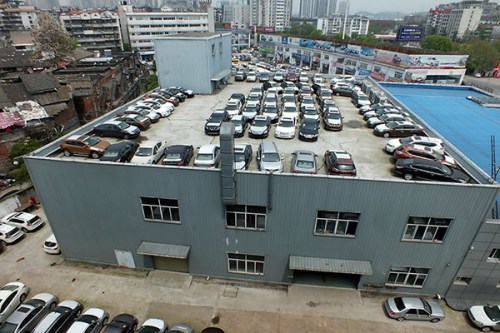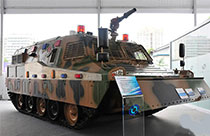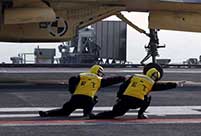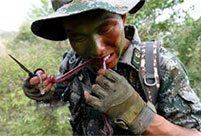


Carmakers urged to work closely with dealers An auto showroom in Yichang, Hubei province, uses its roof as a parking lot to store its unsold cars. Car dealers in China say sales will be sluggish for the second half this year. (Photo/China Daily)
Auto dealers want better cooperation amid wave of closures
As China's auto sales slow, the nation's chamber of commerce that represents car dealers called for better cooperation from automakers to stem the industrywide slump.
The China Auto Dealers Chamber of Commerce predicted that a number of so-called 4S dealerships-which incorporate auto sales, showrooms, services and spare parts-could shut down in the near future.
In a public letter issued on Wednesday, the chamber said it "strongly appeals to carmakers and dealers to face up to reality and strengthen cooperation because development in the auto market can only be sustained if carmakers and dealers work closely together".
In recent months, China's auto industry has been experiencing a major slump in sales growth. Vehicles sold in the first half of the year totaled 11.85 million units, only 1.4 percent higher than the same period a year ago, according to the China Association of Automobile Manufacturers.
It predicted that the auto market will grow by 3 percent this year from 2014, as a result of the nation's economic cooldown and its plummeting stock markets.
One of the biggest casualties of the slump has been the nation's auto dealers, which Wang Ji, the chamber representative, said are "in a bloody battle".
"It's unavoidable that a slew of dealers will quit. Some may withdraw voluntarily from the market, but others may be phased out. Many shops in Shandong and Henan provinces have already been shut down."
Last year, several Hyundai dealers in Shanghai closed up shop while several dealers simply stopped selling imported Renault vehicles.
Pang Da Automobile Trade Co, one of China's major dealership companies, said in its annual report that its network diminished by 125 to 1,226 last year.
Chinese media have reported that some dealership companies have gone bankrupt after failing to pay off loans.
"Carmakers have a dominant position in the industry, and the dealers have no say in the relationship. We need more communication and the chamber will offer help to the member dealers in voicing their issues," Wang said.
Earlier this month, premium carmakers BMW and Jaguar Land Rover voiced greater support for their Chinese dealers after a series of meetings. Reports said financial incentives are being discussed.
High cost
The chamber's letter claimed that dealers are being forced to have an inventory of vehicles that is double the amount of cars they project to sell.
Pang Da, for example, spent 91.9 percent of its total costs on purchasing vehicles for a total of 49.7 billion yuan ($8 billion) last year, according to the company's annual report.
Wang said the auto sales landscape is drying up.
"To meet their inventory requirements, auto dealers must use high-cost funding channels, often with an annual interest rate higher than 15 percent, because they can't obtain 5 percent interest rate loans from banks."
Teng Yan, general manager at Beijing Xinxing Fuqing Automobiles Sales Co, said operational costs and property rents have been climbing.
"And payrolls cannot be reduced. Rent and labor take up about half of the expenses. A new dealer will not realize profit until after three years of operations," said Teng, who added that being unable to find financing is leading to bankruptcies for auto dealers.
Carmakers BMW and Jaguar Land Rover both said in news releases earlier this month that they will work to optimize auto stock inventories and increase profitability for dealers.
Low profit
Teng said returns on investments are dropping and that it takes a long time to pay off investments because annual profit rates in recent months have been hovering around 5 percent.
"Retail prices for new cars are at hefty discounts."
A former employee of the Changjiu Group, a dealership group operating mainly in China's southern provinces, said the company's revenues have mainly come from sales of new cars in recent years but its profits were being used to pay off bank loans.
"If money accumulates, it is used to pay back loans," said the employee who asked not to be named.
According to Pang Da's annual report, sales of vehicles contributed 4.95 percent to the group's gross margin in 2014.
"Dealers' margins are reducing. They are not what they were years ago. Now dealers are not making money by selling new cars, and in fact, dealers in the United States are making more money in after-sales services than selling cars," said Thomas Callarman, director of the China Europe International Business School's Center for Automotive Research.
Carmakers' support
In the letter, the chamber used a Chinese idiom to describe the relationship between carmakers and dealers: "If the lips are gone, the teeth will be cold".
It called upon carmakers to adjust their business philosophies.
"The benefit distribution structures were determined by carmakers, that's the reason why dealers are not making a profit. Some carmakers are continuing to push for unreasonable sales growth by pushing up the inventory on dealers," claimed Wang.
"Many carmakers opened too many 4S showrooms and shops, only to push more stock to more dealers."
The Economic Observer reported last week that carmakers handed out or are planning to offer subsidies to dealers. BMW, for instance, is distributing 7 billion yuan in subsidies.
Mercedes-Benz is handing out 1 billion yuan in subsidies, Jaguar Land Rover 765 million yuan, and Volkswagen is planning subsidies of around 1 billion yuan.
 Student proposes during graduation ceremony
Student proposes during graduation ceremony China-made special vehicles in exhibition
China-made special vehicles in exhibition Soldiers serving at Liaoning aircraft carrier
Soldiers serving at Liaoning aircraft carrier Bikini beauties lifeguards in river rafting place
Bikini beauties lifeguards in river rafting place PLA soldiers eat raw snake meat in harsh training
PLA soldiers eat raw snake meat in harsh training Kiss contest held in Nanning, SW China
Kiss contest held in Nanning, SW China Yunnan-Myanmar Road: The past and present
Yunnan-Myanmar Road: The past and present Photos of beautiful policewoman become online hit
Photos of beautiful policewoman become online hit Campus belle of Xiamen University gets popular online
Campus belle of Xiamen University gets popular online Spending summer on ice
Spending summer on ice Progress of State firms is public’s fortune
Progress of State firms is public’s fortune Soaring pork prices ease farmers’ burden
Soaring pork prices ease farmers’ burden Beijing's bid for the 2022 Winter Olympic Games
Beijing's bid for the 2022 Winter Olympic GamesDay|Week